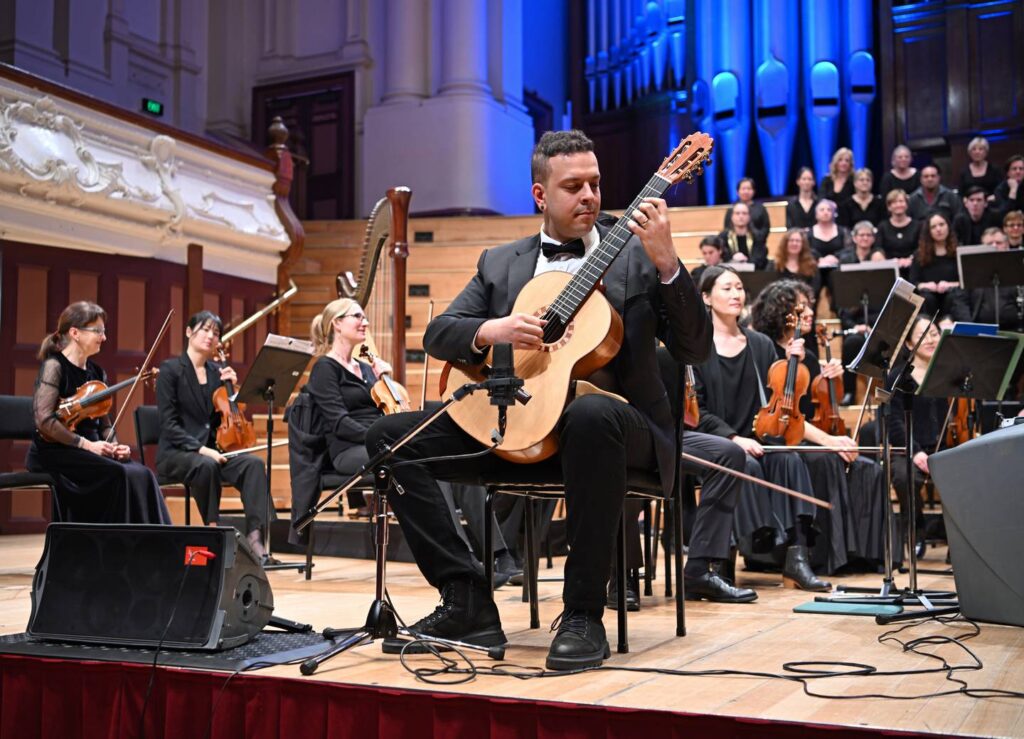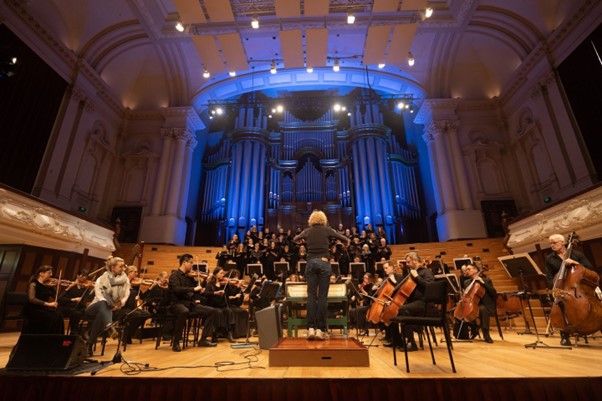Auckland Town Hall, 25 June 2023
Poulenc Gloria
Rodrigo Concierto de Aranjuez
Vivaldi Guitar Concerto
Bramah Kai Pothio Kai Maomai (world premiere)
Rita Paczian Conductor
Barkin Sertkaya Guitar
Katherine Winitana Soprano

Photographs by Peter Jennings and Hans Weichselbaum.
William Dart, NZ Herald
Before a note had been sounded, Bach Musica NZ’s chairman, Peter Rowe, pointed out that tonight’s concert had suffered more than many through pandemic and other perils. Yet, in performance, under the indefatigable Rita Paczian, what followed was a most enjoyable evening.
Guitarist Barkin Sertkaya offered two concertos in the first half.
If he seemed slightly under-amplified, then perhaps it made us focus more closely on the rippling textures of Vivaldi’s D major Concerto, and then surrender to the melting translucence of its classic Largo.
Rodrigo’s Concierto de Aranjuez offered more scope for flamboyance, even if Sertkaya did not quite attain a triple forte after his beautifully sculpted cadenza. Throughout, Paczian’s customary energy kept orchestral colours bursting forth.
Tonight’s centrepiece was the premiere of Kai Pothio Kai Maomai by New Zealand composer Oliver Bramah. This was an ambitious setting of the ancient Greek poet Sappho, acknowledging LGBTQ+ politics in its programme notes, its flowing textures revealing Bramah’s interest in Hindustani classical music.
Listening to his atmospheric sonorities – Baramah, a member of this choir, certainly knows how to write for voices – one could not but feel spiritually uplifted. Mid-piece, florid exchanges between violinist Yanghe Yu and flautist Catherine Bowie brought in a touch of the dramatic, and the choral reprise, with full orchestral, was eminently satisfying.
Poulenc’s Gloria is a magnificent example of a composer finding joy in his faith, with dancing rhythms, piquant dissonances and lyrical melodies that languish in harmonic lushness.
Even with slightly cut-back orchestral forces, this was an exhilarating finale. Choir and orchestra fearlessly navigated the constantly changing time signatures that may well have inspired some particularly zesty body moves from Paczian.
The remarkable Joanna Foote took on its demanding soprano solo with only two days’ notice. Superbly and effortlessly projected without any sacrifice of sweet tone, this was a performance that would have given great joy to its composer as it did to tonight’s audience.

Rainer W. Buhmann
Last Sunday afternoon Bach Musica NZ’s Chairman, Peter Rowe, could not help but introducing Bach Musica NZ’s winter concert with the foreboding message, that because of winter- and pandemic related adversities, this concert had almost disintegrated.
Instead, orchestra and chorus emerged brightly, and their seemingly “indestructible” Musical Director, Rita Paczian, forged ahead – clearly supported by the loyalty and enthusiasm of orchestra and chorus. An afternoon of challenging, captivating and beautiful music followed.
With Rita Paczian directing from the harpsichord, this afternoon’s solo-instrumentalist, classical Guitarist, Barkin Sertkaya, took the stage, performing Antonio Vivaldi’s Concerto for Guitar in D-Major (RV93). Vivaldi’s reflective music prouced an expressed mellow blend between Sertkaya’s virtuosi mastery of his instrument and an equally responsive sound by the accompanying string players.
Antonio Vivaldi, responsible for converting the solo violin concerti of the time into an established and structured art-form within the tempi-framework of Allegro-Largo-Allegro, composed his Concerto for Guitar around 1730. His Largo resonated most deeply with the Town Hall audience on this wintry afternoon, as appropriately it was the winter-theme from his ‘Four Seasons’ violin-concerto, composed ten years earlier, which he simply must have borrowed and inserted into his later composition.
For the second programme item the orchestra’s string players were joined by the woodwind section, horns, and trumpets and, under the impeccable leadership of concertmaster Yanghe Yu, adopted a greater scope of colour and vitality:
Spanish composer Joaquin Rodrigo’s Concierto de Aranjuez, once again featuring Barkin Sertkaya as a guitar soloist.
Virtually blinded from his 3rd birthday, the composer created his work in 1939, acknowledging through his composition the beauty, graces, and splendours of the Gardens of Aranjuez – to his senses only partially accessible. The work has a melancholic stigma throughout, exquisitely brought to the fore by Sertkaya’s sensible and reflective guitar playing and the orchestra’s caring response!
The Concierto de Aranjuez is immediately identifiable by its contemplative second movement, widely adopted by contemporary and film music – and in this concert featuring a tender dialogue between Sertkaya’s guitar and the haunting Cor Anglais of Alison Jepson.
The concert’s 2nd half was devoted to the World Premiere of NZ composer Oliver Bramah’s ‘Kai Pothio Kai Maomai’ and to the ‘Gloria’ of French composer Francis Poulenc.
Featuring Oliver Bramah’s ambitious work is another example of Rita Pazian’s pronounced effort for diversification and inclusiveness.
In rather captivating tonal structures Bramah’s composition revolved around the teachings of Greek author Sappho, blended with Hindustani classical music. The resulting work is ambitious and engaging, its melodious conclusion interspersed with a poignant dialogue between violinist Yanghe Yu, flautist Catherine Bowie and an engaged orchestra. Oliver Bramah, a long-term chorister of Bach Musica NZ, accepted the audience’s sustained applause with great modesty and some bewilderment, as if he had not expected such enthusiastic response.
French composer Francis Poulenc’s “Gloria”, composed in 1959, can widely be regarded as a continuation of French choral tradition, going back to Camille Saint-Saens, Gabriel Faure, Oliver Messiaen and Maurice Durufle. In his “Mass of six Movements”, Poulenc allows the diverse traits of his personality to find their full expression. Tonal structures range from the ‘rousing exuberance’ as in “Gloria in excelsis Deo”, some mischievous dissonances and staccato patterns of Carl Orff connotations to sublime majesty.
The dialogue between Chorus and Soprano in “Domine Deus, Rex Coelestis” is exquisite – the dialogue in “Domine Deus, Agnus Dei” unashamedly dramatic.
Outstanding soprano, Joanna Foote, took on her demanding and responsible solo-part with just 2 days’ notice, as the originally cast Katherine Winitana unfortunately had to withdraw on account of sudden illness.
It was the assuredness and authority of Joanna Foote’s accomplished soprano, which added another element of depth to this Poulenc Gloria performance. The work’s tonal might and majesty were clearly evident, when from an initial ‘fortissimo’ in “Qui sedes ad dexteram Patris” the dialogue ultimately remained in the hands of Soprano Joanna Foote, who concluded the work with her barely audible “Amen”, sung in a compelling ‘pianissimo’.
Bach Musica NZ once again delivered a concert to its loyal audience,
which was a triumph, a demonstration of unparalleled performing strength by its orchestra and chorus – underpinned by the uncompromised tenacity and commitment of its gifted Musical Director.
Rainer W. Buhmann
Clare Martin

Cross-genre exoticism was the programme presented by BACH MUSICA NZ on Sunday evening at the Auckland Town Hall. The programme spanned sixteenth century Baroque to a New Zealand work written in the last few years drawing on Hindustani classical music. The cornerstone of the evening was Francis Poulenc’s Gloria, a partly self-taught French composer whose sound was both traditionally Catholic and irreverently modern.
Two well-known works led the way, our hearts won over by the opening – Antonio Vivaldi’s Concerto for Guitar in D Major. Soloist Barkin Sertkaya’s supremely eloquent tone was at times subdued by the scale of the Town Hall acoustic. The orchestra played with elegance, warmly led by the leader of the orchestra, violinist Yanghe Yu and artistic director Rita Paczian on the harpsichord.
The second work, Joaquin Rodrigo’s Concierto de Aranjuez burst into life with vibrant colours. The more robust Spanish style gave clarity and volume to the guitar sound. Here was a wonderful opportunity to hear an international-level soloist – Sertkaya’s performance abounded with beauty and flair. Cor Anglais player Alison Jepson led the ensemble into the Adagio section with exquisite tenderness.
Bravo to artistic director Paczian for championing young composers. After an interval, the half-full house heard the debut performance of Oliver Bramah’s Kaì Pothío Kaì Máomai. Based on ancient Greek Sappho’s poetic fragments, sung in modern Greek, this was a sensual work. An hypnotic chorus led into some beautiful lovers’ dialogues between flutist Catherine Bowie and violinist Yu. At times the excellent Bach Musica Choir’s voices were somewhat overtopped by orchestral writing in the same pitch-range. Intriguingly, the Hindustani classical tonality reminded me of Vaughan Williams’ Lark Ascending. Bramah’s impressionistic style captured an eternal yearning for love. The composer himself stepped out of the choir ranks with Paczian’s enthusiastic encouragement to take a bow.
The angular drama of Poulenc’s most celebrated work, his Gloria was next. I would guess some audience members found this a less accessible work. But it is a piece of sheer originality and energy and this was captured by Bach Musica. Despite smaller orchestral forces, Paczian drew expressive playing from the orchestra, leading off the Laudamus te section at an exciting clip.
The misterioso/other-worldly quality brought in the soprano’s Domine Deus part of the work. Soloist Joanna Foote stepped in with only two days’ notice to perform with astonishing assurance. Her upward rising phrases of “Domine Deus” were pitch perfect and shimmered with gold. Here Paczian drew out sorrowful depths from the ensemble. The evening was crowned by the triumph of the final movement Qui sedes ad dexteram Patris with an excellent blaze of brass sound and energetically-articulated text from the choir.
This evening has been a long time coming – the Pandemic had often interrupted Bach Musica’s performance schedules. But we were glad to have such a rich programme. The Auckland Town Hall rang with passionate sounds spanning five centuries and as many cultures.
